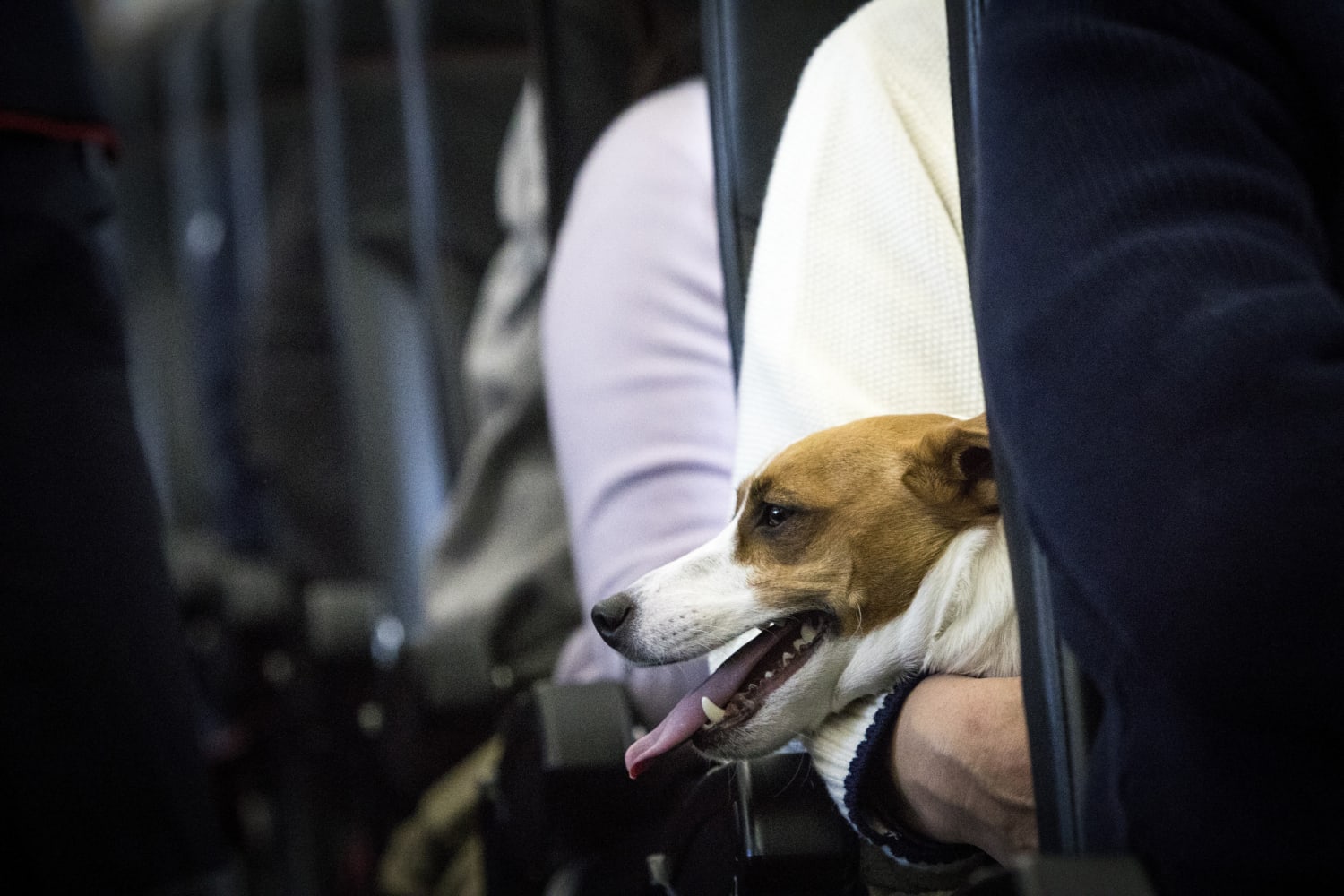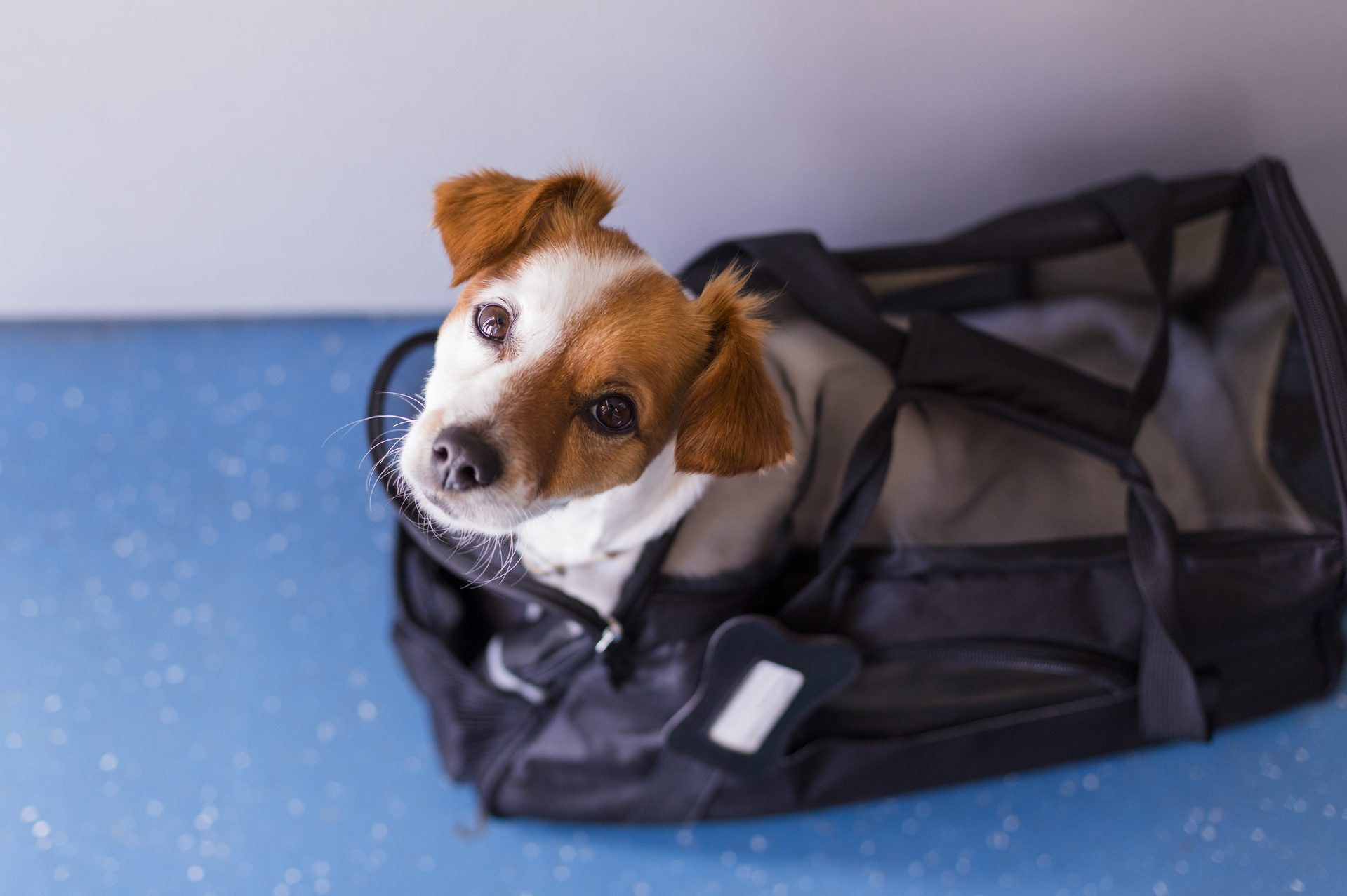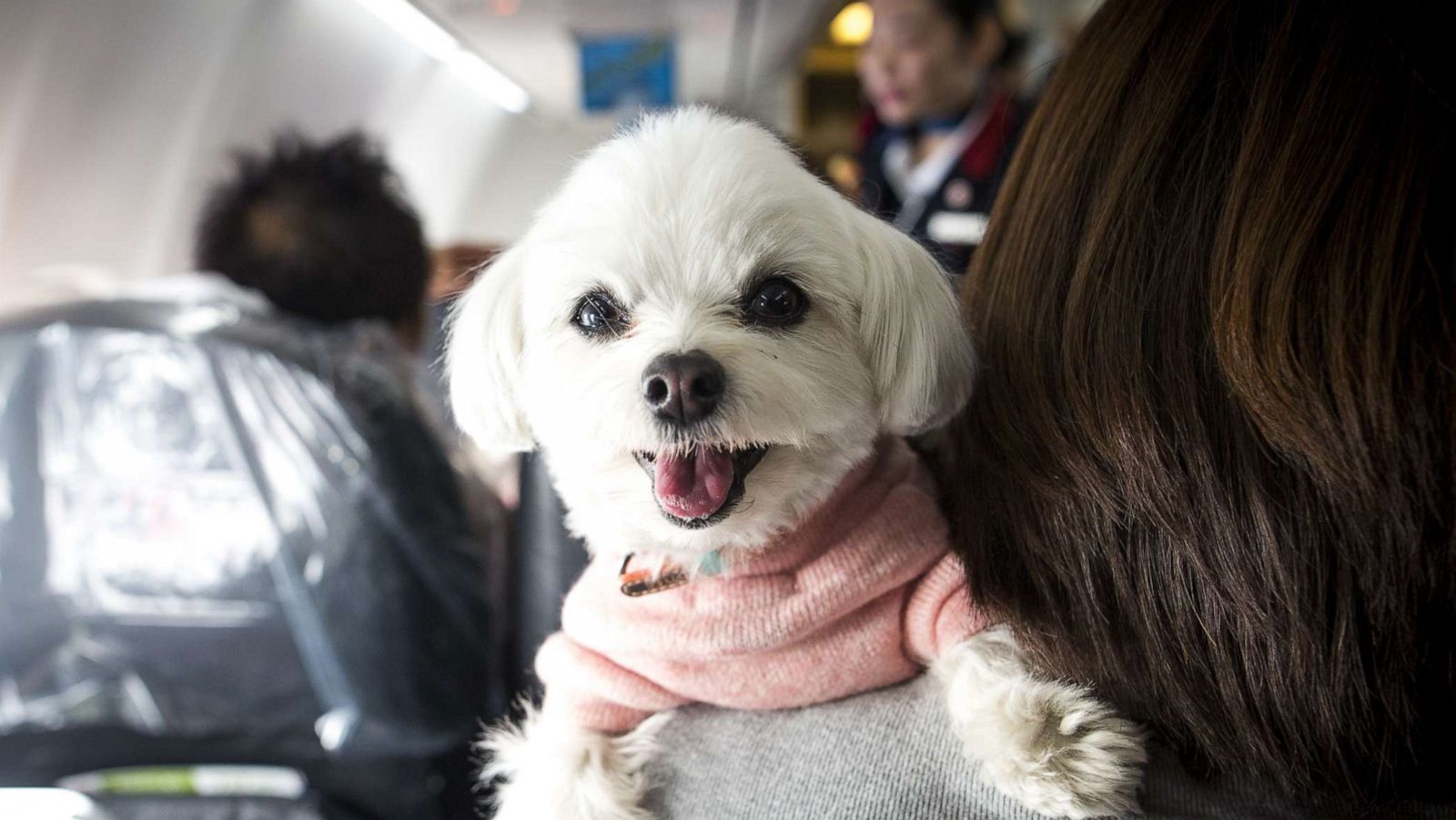Traveling with your pets can be pretty tricky and not to mention anxiety-inducing. Finding an airline ready to accommodate you is challenging, but their policies can be confusing, even if they accept pets.
Luckily Delta’s pet policy is straightforward, and the airline tells you all you need to know about how it works and the requirements. The Delta pet policy allows some animals to travel as carry-ons based on their size and what types of animals they are. On the other hand, some pet passengers can ship as cargo.
Delta Pet Policy: Carry-On Pets
As per Delta Airlines’ pet policy, small dogs, cats, and household birds can travel as carry-ons in the cabin with their owners. The in-cabin travel for carry-on pets requires a one-way fee that Delta will collect at check-in.
The pets you bring in cabin kennels will count as your carry-on item, meaning you can only bring one personal item onboard the plane.
Delta Airlines allows passengers to bring only one pet carrier on board, while the pet must be at least ten weeks old for domestic travel. However, if you are traveling to the United States from another country, the pet should be at least 16 weeks old, and when traveling to a country in the European Union, at least 15 weeks old.
Moreover, you can only bring one inside the carrier for the pet’s comfort, with a few exceptions.
- One cat or dog of the female gender can travel with their unweaned litter in a kennel, given that the litter is between ten weeks to six months of age. There is no limit on the number of animals in the litter.
- Two pets of the same breed and size can travel in one kennel as long as they are small enough to fit into the same kennel. In this case, they will be charged as one pet.
/cdn.vox-cdn.com/uploads/chorus_image/image/62664974/GettyImages_500611889.0.jpg)
Requirements for carry-on kennels
You must ensure that your pet can fit in a small and ventilated pet carrier that will fit under the seat in front of you. The pet carrier also must meet the following Delta Airlines requirements:
- The pet must be small enough and fit comfortably in the carrier without touching or protruding from its sides. The animal should have the ability to move around in the kennel.
- Both soft or hard-sided kennels must be leak-proof and with ventilation openings on three sides (four sides for international travel).
- The maximum dimensions for the carry-on kennel vary and are determined by your flight, as the space under seats varies by aircraft. Delta Airlines recommends using a soft-sided kennel with maximum dimensions of 18″ x 11″ x 11″ since it fits most aircraft types.
- As per Delta’s recommendation, you should check your flight’s aircraft dimensions to ensure the kennel will fit.
- The pet must remain inside its kennel with the door secured while in a Delta boarding area during boarding and deplaning. Also, the pet must be in the Delta airport lounge kennel and on board the aircraft.
- Delta requires that you fasten the top and bottom halves of your pet crate together. You should use either metal or plastic threaded nuts and bolts to secure both halves of the crate.
Onboard rules for passengers with carry-on pets
Besides your pet having to remain inside their kennel closed/zipped up for the entire flight, passengers with carry-on pets may not sit in the following areas:
- Bulkhead seats
- An emergency exit row
- Seats designated as “no stowage”
- Flat-bed seats
- Rows 30-35 on the A330-200 aircraft
- Rows 30-43 on the A330-300 aircraft
- Center seats on the B757-200 aircraft
- Delta One® seats

Fees for carry-on pets
It is important to note that CAD will be charged for exiting Canada and EUR for exiting Europe. The one-way fee for carry-on pets at Delta Airlines is
- Fees to/from U.S./Canada/Puerto Rico/ U.S. Virgin Islands – USD/CAD 125
- Fees for international flights are USD/CAD/EUR 200.
- Fees to/from Brazil are USD 75.
Carry-on pet exceptions
If you plan to travel to any of the destinations we mention next, all pets must travel as cargo and cannot be in the cabin, except for service animals.
- Hawaii
- Australia
- Barbados
- Brazil – Exit Brazil
- Colombia – Exit Colombia
- Dubai
- Hong Kong
- Iceland
- Jamaica
- New Zealand
- Republic of Ireland
- United Kingdom
- United Arab Emirates
Additionally, the CDC has an ongoing, temporary suspension prohibiting the entry of dogs, and trained service animals, from high-risk countries for dog rabies into the United States. Per the CDC guidelines, dogs from high-risk countries must appear healthy, be microchipped, and be at least six months old.

Reservations for carry-on pets
Pets as carry-ons are accepted on a first-come, first-serve basis. After you check that your pet meets all the requirements set by Delta Airlines, you should contact Delta Reservations to arrange to bring your pet on board.
Suppose you take a flight operated by one of Delta’s airline partners. In that case, you should check directly with the operating carrier to find out their policies about bringing the pet into the cabin on international flights.
When contacting Delta Reservations, Delta Airlines also urges customers to have their kennel dimensions (length, width, and height) ready. With the intent of ensuring their passengers’ comfort, Delta puts a limit on the total number of pets per flight.
Checking in with a carry-on pet
Once you get to the airport, you must head to the Special Service Counter to check in with your pet. At the Special Service Counter for check-in, a Delta agent will ensure the pet and kennel meet Delta’s requirements for the trip and collect the set pet fee.
It is important to remember to allow extra time at check-in for Delta to ensure your pet is ready for take-off. After you are checked in and get your cabin pet tag, you can proceed to the security checkpoint. Once you are at the checkpoint, you must take your pet out of the kennel.
The pet must stay in the kennel in the airports except at the security checkpoint and the designated relief areas.

Delta Sky Club® with pets
If you visit a Delta Sky Club with your carry-on pet, Delta’s policies are the same as on board and aircraft. Your pet must remain in its appropriate kennel with the door secured while inside Delta Sky Club for the safety and discomfort of the animal and the rest of Delta Sky Club guests.
You can ask one of Delta’s representatives to help you find a pet relief area. Pet relief areas are available at most airports for passengers with pets and trained service animals.
Delta Pet Policy: Shipping Your Pet With Delta Cargo
If your pet does not meet the requirements for carry-on travel, you can ship them with the airline’s special shipping service Delta Cargo. Delta Cargo provides reliable and safe year-round transportation to meet the needs of all pets shipped without their owners.
Delta cargo requirements
- You will need a separate booking from your flight itinerary for your pet. Additional fees and charges may apply.
- If you ship your pet domestically via Delta Cargo, you cannot book it until 14 days prior to departure.
- Your pet is not guaranteed to be shipped on the same flight or flight schedule as you.
- If you are shipping your pet, Delta requires you to drop it off at a Delta Cargo location at least three hours before departure time. The Delta Cargo location is separate from passenger check-in.
- You will need to pick up your pet at a Delta Cargo location.
- Delta Cargo accepts international pet shipments only from reputable shipping companies. Delta requires international passengers to use a pet shipper approved by the International Pet and Animal Transportation Association.

Health requirements
Knowing the risks
Often, traveling via cargo can be stressful for animals due to exposure to unknown environments, people, and movements. It can impact each animal differently, leading to injury, illness, escape, or death.
Delta encourages passengers to discuss all the risks of air travel with their pet’s veterinarian when getting its health certificate. The most important things to consider are your pet’s age, medical history of pre-existing conditions, and if it has an anxiety disorder that cargo travel may exacerbate.
- Age – Delta does not have a maximum age for air travel because life expectancy varies among breeds. But do keep in mind that impaired vision or hearing, liver, kidney, or heart disease, cancer, arthritis, senility, diabetes, and weakness can impact older animals more.
- Breed – Delta does not permit Brachycephalic (snub-nosed) dogs or cats and their mixes on Delta or Delta Connection flights.
Health certificate
If you are shipping your pet, Delta requires you to take out a health certificate for it. A licensed veterinarian must issue the health certificate within ten days of transport and include.
- Your name and address.
- Tag numbers or tattoos assigned to the pet.
- The age of the pet you are shipping. According to USDA regulations, animals must be at least eight weeks old and fully weaned before traveling domestically. For travel from other countries to the U.S., animals must be at least 16 weeks old, and 15 weeks old for European travel.
- A statement that the pet is in good health. If you know your pet is pregnant, you must include it on the health certificate.
- List of administered inoculations when applicable.
- Veterinarian’s signature.
- Date of the health certificate.
Live animal checklist
At check-in, you will be asked to complete a live animal checklist. Signing the checklist confirms that your pet has been offered food and water within four hours of check-in. You must also provide watering and feeding instructions for a 24-hour period, and food in case in-transit feeding is necessary.

Tranquilizers
Because using pet tranquilizers at high altitudes is unpredictable, you must have written consent from the pet’s veterinarian if you plan to sedate it. Delta requires that you attach the sedation information to your pet’s crate.
However, sedation of household cats and dogs is not permitted, and you must remember that Delta agents cannot administer any medication.
Weather requirements
Delta Airlines observes seasonal restrictions on pet travel to ensure your pet’s safety, meaning it does not ship pets during extreme weather.
The restrictions include temperatures exceeding 80˚F (27˚C) or if the temperature drops below 20˚F (-7˚C) while your pet is on the ground at any point during the trip. Delta requires a certificate of acclimation when temperatures fall between 20˚F (-7˚C) and 45˚F (7˚C).
Hawaii and Pets
Due to Hawaii’s unique ecosystems, the state takes extra care when bringing in live animals despite being part of the U.S.
According to Hawaii’s regulations, all live animals shipped or brought into the state must have health and rabies inoculation certificates that date no more than ten days before traveling. For flights to Hawaii, Delta does not accept pets as carry-on baggage.

International Pet Travel
If you plan to travel internationally with your pet, you should prepare by familiarizing yourself with pet travel’s strict regulations. In order to be fully prepared, you should take the following steps before traveling:
- Determine the pet travel regulations by contacting the embassy or consulate of the destination country.
- Gather all necessary paperwork for your pet’s travel.
- Contact your pet’s veterinarian to ensure the animal complies with foreign health regulations.
- About the importation of pets into the U.S., check with the CDC.
- For international animal export regulations, check with APHIS.
- Additional fees and charges may apply, including terminal handling charges, custom clearance fees, veterinarian service, kennel storage fees, and shipping rates upon arrival at the destination airport. You must pay all fees and charges in full before the release of your pet.
Conclusion
There you have all the details about the Delta pet policy if you are planning a trip with your pet. It is important to remember that your pet must be safe and comfortable during your flight to avoid health issues like anxiety. As long as you fully familiarize yourself with and follow Delta’s pet policy, you and your pet will have a comfortable journey to your destination.


Leave a Reply